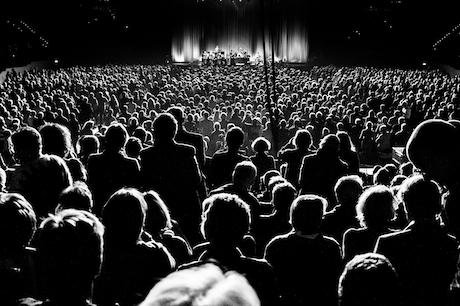
An Audience. Roger Reuver/flickr. Some rights reserved.
In concluding the fourth section of Theatre of the Oppressed (2000 [1979]), Augusto Boal writes:
“Spectator’ is a bad word! The spectator is less than a man and it is necessary to humanize him, to restore to him his capacity of action in all its fullness. He too must be a subject, an actor on an equal plane with those generally accepted as actors, who must also be spectators. All these experiments of a people’s theatre have the same objective – the liberation of the spectator, on whom the theatre has imposed finished visions of the world’ (Boal, 2000 [1979]: 154-5).
Boal’s theatrical model, as described in Theatre of the Oppressed, with its focus on the dialogical exchange between the on stage action and the audience, and with its Marxist lines of thought and critique, still echoes as one of the most utterly political explorations of the problem of audience’s passivity and inaction. In particular, Boal’s ‘Forum Theatre’ is a theatrical technique that allows the audience to intervene (with a guidance of a facilitator – a Joker) in the plays and develop alternative ways of resolving a specific conflict that creates oppression and inequality. Boal’s theatre, along with his proposal for engaging with ‘spect-actors’, has been a polemical critique (a theatrical manifesto) of bourgeois representational theatre that resonates with the many initiatives of political theatre that followed.
‘Spectator’: a bad word
Boal argues that the word ‘spectator’ is bad. This statement resonates with a significant body of critique that has highlighted the need to make spectators agents of meaning and active subjects in performances. From Raymond Williams who argued that, ‘[w[atching itself has become problematic’ (Williams, 1983: 11); to Baz Kershaw who maintained that, [t]he totally passive audience is a figment of the imagination, a practical impossibility’, inactive spectatorship has been rendered one of the most important problems not only in theatre, but also in the entire realm of cultural politics (Kershaw, 1992: 16).
But why is ‘spectator’ a bad word? And, most importantly, what are the assumptions that need further questioning in the act of emancipating spectators from a condition of passivity and inaction?
De-objectifying the audience
The challenge of introducing agency to theatre audiences has been frequently thought in conjunction with a process of de-objectifying the spectators’ presence in performance spaces. In many cases, the way out of audience passivity and the creation of engaging conditions of performance have been thought alongside certain ‘ground rules’ that produce agential possibilities for the spectators, transforming them into active participants of a shared theatrical experience. Community art practice and interactive theatres that follow Boal’s theatrical techniques is a good example of this kind of approach to the problem of audience inaction. The grand aim of democratizing theatrical production and reception has been widely sought by establishing a systematization of methods that promote participatory ways of engaging audiences and dialogical narratives. For some, this is a very broad framework through which we can define the ‘postmodern spectator’.
For example, in an auto-biographical tone, the actor, dancer and writer Katherine Adamenko notes:
‘I ask the postmodern spectator to enter a new kind of contract with the makers of new performance. I ask this new postmodern spectator for three things: investment, to engage in an interaction the performer is asking you to do; complicity, to act without self-consciousness in that activity; and discipline, to commit to opening yourself to new forms of audience interaction’ (Adamenko, 2003: 15).
For others, this is an approach that foregrounds a more localized way of producing a politicized theatre, or a community theatre with ‘its emphasis on local and/or personal stories (rather than pre-written scripts) that are first processed through improvisation and then collectively shaped into theatre under the guidance either of outside professional artists […] or of local amateur artists’ (Van Erven, 2001: 2).
In any case, what is the main concern of many of these theatre projects is finding the most effective way to de-objectify the spectators, enabling them to become agents of the performance, i.e. the subjects or co-authors of theatrical production. Furthermore, as already mentioned, de-objectifying audiences depends upon certain sets of regulations (either ethical, political, ideological, cultural, or practical) that operate as the facilitative means to achieve and maintain the democratic character of this process.
This makes sense considering that failure to address certain important issues while creating conditions of interaction and participation in a theatrical event could lead to chaotic, repressive and even practically dangerous situations.
A problematic romanticism?
At the same time, what I identify as problematic in these techniques of de-objectification is the extent to which they are considered as ‘ends in themselves’, i.e. as romanticized egalitarian conditions that take the form of static ‘theorems’ with regard to the problems of representation and agency in political theatre contexts. I argue that what is at stake in systematizing the de-objectification of audiences is the very character of revolutionary practice being penetrated by a certain kind of political ‘professionalism’ that functions through totalizing concepts, inflexible techniques of participation and moral imperatives; which in turn expose the problem of hierarchy and abstract authority that exists within certain systematized acts of resistance to hegemonic systems of power.
I argue that the systematization and the typification of the conditions that de-objectify and introduce agency to the spectator need to be rendered problematic, and by extension, incapable of revolutionizing the theatrical process. While the participatory models of performance and the conventions of community-based theatre address and frequently challenge political dogmatism, they however maintain the problem of hierarchy intact by ‘transferring’ it to a different, more dialogical level of engaging.
The paradox of the spectator
Recently, in The Emancipated Spectator (2011 [2009]), Jacques Ranciere gives an account of the complexity inherent in the problem of spectatorship that is very useful here; particularly if seen as a response to these forms of theatre that understand any form of audience participation as a definitive break with conformist ways of experiencing performances. Interestingly, Ranciere also uses the adjective ‘bad’ to describe the condition of conventional spectatorship, whilst formulating what he calls ‘the paradox of the spectator’:
‘there is no theatre without a spectator […] But […] being a spectator is a bad thing for two reasons. First, viewing is the opposite of knowing: the spectator is held before an appearance in a state of ignorance about the process of production of this appearance and about the reality it conceals. Second, it is the opposite of acting: the spectator remains immobile in her seat, passive. To be a spectator is to be separated from both the capacity to know and the power to act’ (Ranciere, 2011 [2009]: 2).
In problematizing this contradiction, Ranciere underlines the need to subvert the power of representation as projected from the spectacle to the spectators, by focusing on the ways in which knowledge becomes possible. He argues for ‘a theatre without spectators, where those in attendance learn from as opposed to being seduced by images; where they become active participants as opposed to passive voyeurs’ (ibid: 4). In describing the problem, Ranciere’s critique is at first glance compatible both to Brecht’s anti-illusory theatre and to Boal’s opposition to the bourgeois spectacle-performances.
However, I suggest that it is in his critical analysis of ‘how to proceed’ that his differentiation from Brecht and Boal becomes evident and his contribution to the discourse on spectatorship is most useful.
Ranciere does not advocate a Brechtian theatre in which the spectator occupies a rational position of watching the on stage action from a relative distance. He is critical of this distance in so far as it maintains an opposition between knowledge and ignorance. By pointing out that, ‘[t]he spectator must be removed from the position of observer calmly examining the spectacle offered to her’ Ranciere, echoing Artaud, argues that ‘she will exchange the privilege of rational observer for that of the being in possession of all her vital energies’ (ibid).
Schoolmaster and pupil
Thus, on one level Ranciere’s argument stresses the importance of breaking with a notion of spectatorship conceived as a passive condition of attending, viewing or witnessing something that exceeds one’s reach.
On a second level, and this is where his account can be seen as critical not only of Boal’s theatre but of participatory theatres in general, Ranciere identifies important problems in the processes of de-objectifying spectators. He argues that those who ‘intend to teach their spectators ways of ceasing to be spectators’ assume a different form of subjection that pertains to the distance between knowledge and ignorance (ibid: 7-8).
To make his point, Ranciere uses the example of the distance between a schoolmaster and a pupil, an ignoramus (borrowed from his 1991 work The Ignorant Schoolmaster) which is maintained not because of the pupil’s inability to understand but because of his/her continuous lack of access to what the schoolmaster knows. Ranciere notes:
‘[The schoolmaster] can only reduce the distance on condition that he constantly re-creates it. To replace ignorance by knowledge, he must always be one step ahead, install a new form of ignorance between the pupil and himself’ (ibid: 8).
Thus, Ranciere goes on to argue that the capacity to know, and consequently the power to act, is not a matter of quantity of knowledge (of how much one knows), but a position. In other words, he makes clear that what is at stake is not giving the spectator or the pupil the opportunity to know more (since the director or the schoolmaster will always know even more), but destabilizing the fixed subject-positioning that produces subjection and creates hierarchical conditions in theatrical performances or learning processes. Ranciere suggests:
‘[E]mancipation begins when we challenge the opposition between viewing and acting; when we understand that the self-evident facts that structure the relations between saying, seeing and doing themselves belong to the structure of domination and subjection. It begins when we understand that viewing is also an action that confirms or transforms this distribution of positions’ (ibid: 13).
An open political space
Following from Ranciere’s argument, I suggest that it is not the introduction of subjectivity to the spectator that emancipates a performance from ideological didactics and political determinacy; rather, it is by virtue of destabilizing the entire system of power and authority, the hierarchical structure of theatre that we can speak of a radical challenge to these problems of representation.
This destabilization entails an understanding of the spectator-subject not as an end-in-itself, but as one of the starting points in the production of a destratified theatre.
A political theatre that does not abstractly establish the ‘active spectator’ as a free subject – by contrasting it with a ‘passive spectator’ conceived as a restricted object – but one that lays claim to a democratic radicalization of all theatrical conditions by challenging the fixed positioning of performers and spectators, while creating an open political space (a political mise en scène to which spectators would relate directly) that dismisses any podiums that impose fixed images of an abstract politics or dictate ready-made dialogues between performances and audiences.
Read more
Get our weekly email



Comments
We encourage anyone to comment, please consult the oD commenting guidelines if you have any questions.